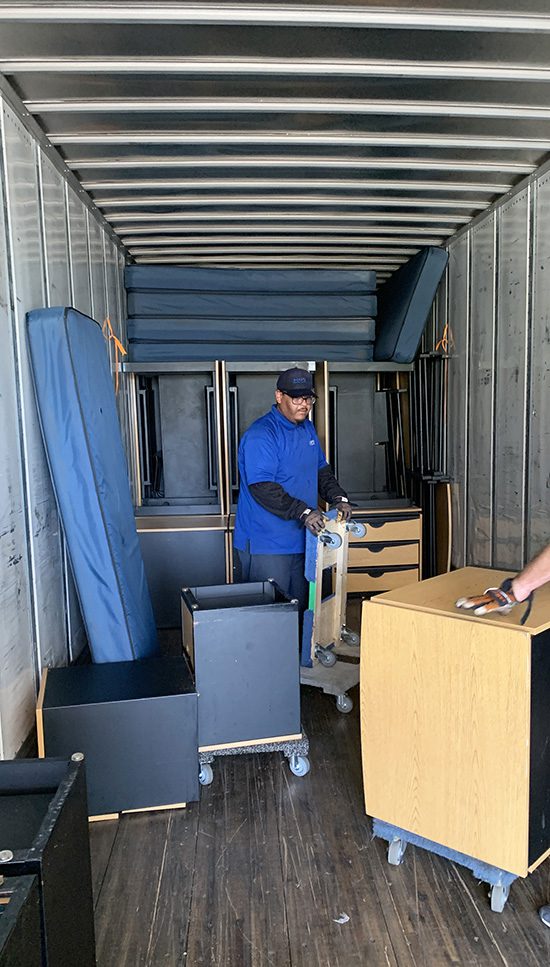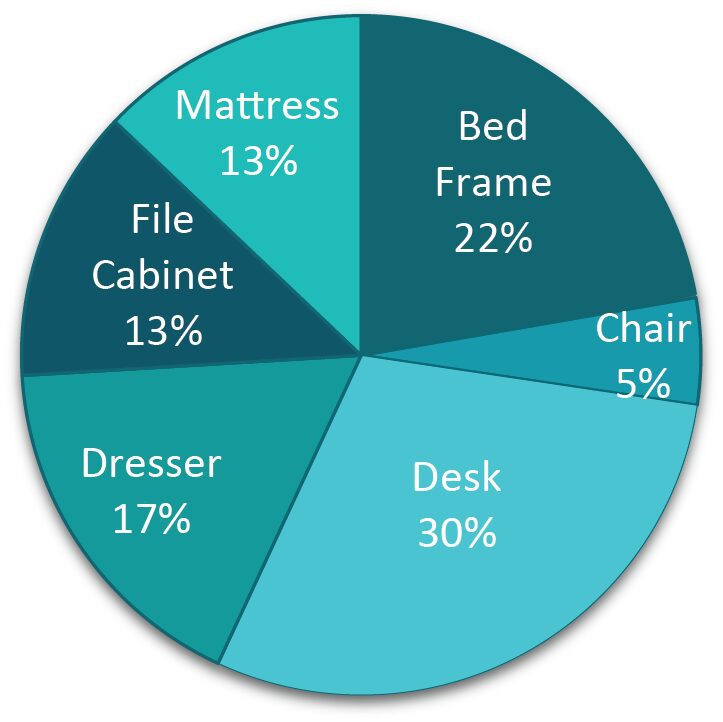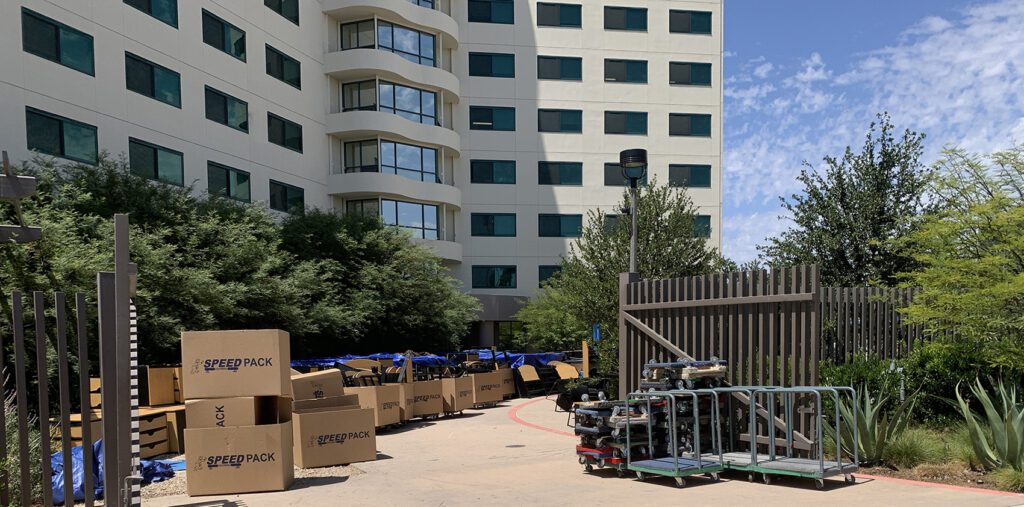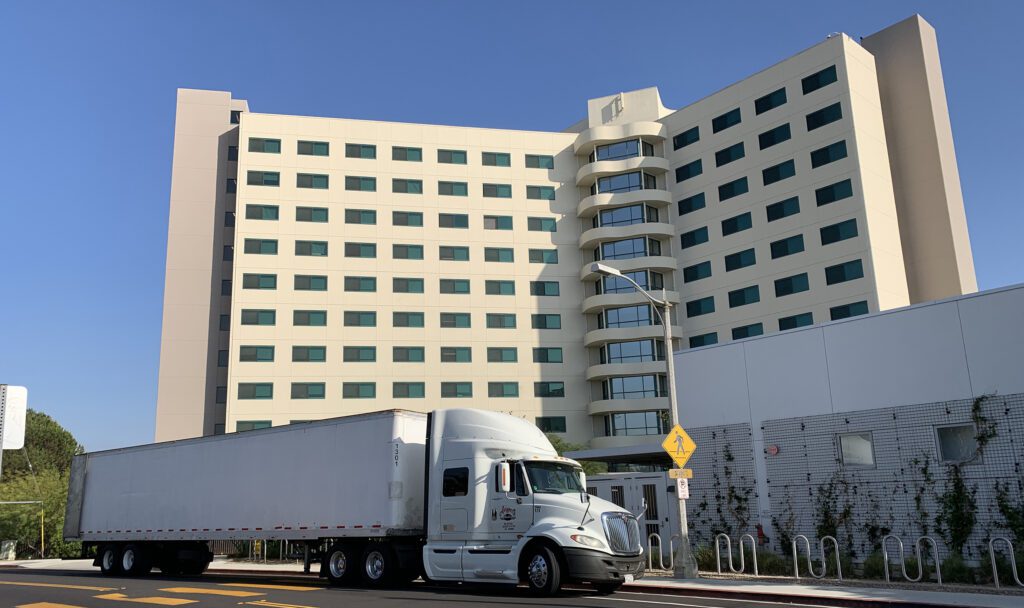San Diego State University is committed to sustainable practices that not only help the environment but also benefit the community at large. Chapultepec Hall underwent refurbishment during the summer of 2022. All of the furniture in the dormitory rooms was replaced, resulting in nearly three thousand surplus items.
SDSU wanted a solution for this large surplus inventory that would divert these usable items from the landfill. Furniture Reuse Solutions (FRS) had the answer in the way of charitable reuse. FRS matched the inventory with nonprofit organizations in the US and abroad.
Project Description
Opportunity / Challenges
When a dormitory furniture replacement project generates unneeded surplus, the question of asset disposition arises. There is no discernable resale value, little recycling value, and disposal costs are high for such heavy and bulky furnishings. SDSU found a solution that upheld their sustainability goals while being well within their cost constraints. The solution, implemented via FRS, was charitable reuse.
The volume was huge – nearly 3,000 pieces – and the schedule was ambitious. The project required efficient management to keep the moving and trucking plans on track.
Solution
Over the course of four weeks, during very hot weather, 100 tons of furniture were removed from Chapultepec Hall and sent to their destinations in 53’ tractor trailers or 40’ shipping containers. Despite the transportation supply chain issues that were so prevalent during the summer of 2022, the trucks had a 99% on-time rate. FRS rotated three site managers throughout the project and they each ensured that the correct product mix was loaded so that the charity’s expectations would be met. SDSU was incredibly organized and moving and loading went smoothly. Thanks to
packing efficiencies and use of 53’ trailers for ten of the twelve shipments, the project ended up costing 23% less than the originally proposed price.

Results

2,925 Items Repurposed
SDSU generated 2,925 furniture items for reuse, including bed frames, mattresses, desks, dressers, chairs, and cabinets. These items filled two 40’ ocean containers and ten tractor trailers.

100 Tons Diverted from Landfill
By diverting from the landfill, the district realized a greenhouse gas offset equivalent to conserving 21,187 gallons of gasoline (188 MTCO2E).

Cost Savings
Reuse is less expensive than disposal and recycling. This inventory would have required a minimum of 50 30-yard roll-off waste containers.

Social Responsibility
Ten shipments went to domestic nonprofits to be distributed in disadvantaged communities or sold in thrift stores. An international charity sponsored two shipments, one to Africa and another to the Caribbean, to be used in their relief and development efforts.

Inventory
| Item | Pieces | Weight (lbs) |
|---|---|---|
| Desk | 439 | 59,265 |
| Bedframe | 521 | 44,285 |
| Dresser | 528 | 34,320 |
| File Cabinet | 654 | 26,115 |
| Mattress | 375 | 25,875 |
| Chair | 398 | 10,155 |
| Bookcase | 10 | 350 |
| Totals: | 2,925 | 200,365 |


Destinations
The surplus was a very desirable match for both domestic international recipients. The uses include selling the furniture in nonprofit stores to raise funds for humanitarian endeavors, distribution to underserved communities, and upgrading dormitory furniture in indigent areas.
| Destination | Purpose | Pieces |
|---|---|---|
| Marysville, CA | Fundraising for affordable housing | 240 |
| Santa Rosa, CA | Fundraising for affordable housing | 238 |
| Lenexa, KS | Fundraising for affordable housing | 300 |
| Kansas City, MO | Fundraising for affordable housing | 537 |
| Muskogee, OK | Distribution to disadvantaged communities | 634 |
| Dominican Republic | Student housing for trade schools | 230 |
| Swaziland | Student housing for trade schools | 241 |
| Lebanon, OR | Fundraising to support addiction recovery programs | 302 |
| Spokane, WA | Refugee aid | 203 |

“At SDSU we are committed to building a more sustainable world. By diverting 100 tons from the landfill, we not only helped the environment, but we helped improve lives in many communities as well. The project was a huge success.”
John Godfrey, Associate Director for Business Operations, SDSU Office of Housing Administration
